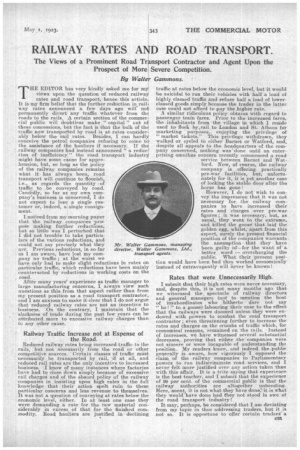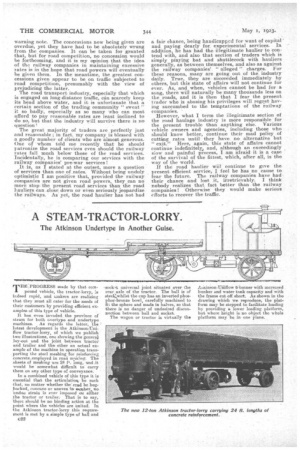RAILWAY RATES A D ROAD TRANSPORT.
Page 21

Page 22

If you've noticed an error in this article please click here to report it so we can fix it.
• The Views of a Prominent Road Tr Prospect of More nsport Contractor and Agent Upon the Severe Competition.
By Waite Gammons.
• THE EDITOR has very kindly asked me for m
views upon the question of reduced railway
rates and road transport, hence this article. It is my firm belief that the further reduction in railway rates announced afew days ago will not permanently divert any traffic whatever from the roads to the rails. A certain section of the commercial public will doubtless make " capital" out of these concessions, but the fact is that the bulk of the traffic now transported by road is at rates considerably below the rail rates. Besides, I can hardly conceive the petrol companies refusing to come t the assista,nce of the hauliers if necessary. If th railway companies had instead announced'C a reduc tion of inefficiency" the road transport industr might have some cause for apprehension, but, so long as the policy of the railway companies remains what it has always been, road transport will continue to flourish, i.e. as regards the quantity of traffic to be conveyed by road. Candidly, so far as my own company's business is concerned, I do not expect to lose a single customer or, indeed, a single consignment.
I noticed from my morning paper that the railway companies prce pose making further reductions, but so littlewas I perturbed that I did not trouble to take particulars of the various reductions, and could not say precisely what they are. Previous reductions, in so far as I am aware, have lost my company no traffic ; at the worst we • have only had to make slight reductions in rates on particular traffic, which reductions have been mainly counteracted by reductions in working costs on the road. ,
After many years' experience as traffic manager to large manufacturing concerns, I aiways view such questions as this from that aspect rather than from my present position as a road transport contractor, and I am anxious to make it clear that I do not argue that reduced railway rates are not an incentive to business. On the contrary, I maintain that the slackness of trade during the past few years can be attributed more to excessive railway charges than to any other cause.
Railway Traffic Increase not at Expense of the Road.
Reduced railway rates bring increased traffic to the rails, but not necessarily from the road • or other competitive sources. Certain classes of traffic mist necessarily be transported by rail, if at all, and reduced rail rates are the only incentive to increased business. I know of many instances where factories have had to close flown simply because of excessive rail charges and :of the absurd policy of the railway companies in insisting upon high rates in the full knowledge that their action spelt ruin to these particular. concerns and less .revenue to, themselves. It was not a question of conveying at rates below the economic level, either. In at least one case they were demanding a rate for the raw material considerably in excess of that for the finished come modity. Road, hauliers are justified in declining traffic at rates below the economic level, but it would be suicidal to run their vehicles with half a load of highly classed traffic and refuse half a load of lowerclassed goods simply because the trader in the latter case could not afford to pay the higher rate.. A similar ridiculous policy obtains with regard to passenger train fares. Prior to the increased fares, the inhabitants from the village in which I reside used to Hoek by,rail, to London and $t. Albans for marketing purposes,. enjoying the privilege of " market tickets." This privilege withdrawn' they walked or -cycled to either Barnet or Watford, and, despite all appeals to the headquarters of the company concerned, nothing was' done until an enterprising omnibus concern recently commenced a road
service between Barnet and Wat ford. Now, of course, the railway company is offering practically pre-war facilities, but, unfortu nately for it, it is yet another case of locking the stable door after the horse has gone !
However, I do not wish to convey the impression that it was not necessary for, the railway companies to have increased their rates and charges over pre-war figures ; it was necessary, but, as usual, they went to the extreme, and killed the goose that laid the golden egg, whilst, apart from this aspect, surely the present financial position of the companies warrants. the . assumption that they have been guilty of—for the want of. a better word overcharging the public. What their present posi
tion would have been had they worked economically instead of extravagantly will never be known!
Rates that were Unnecessarily High.
I submit that their high rates Were never necessary, and, despite this, it is not many months ago that we witnessed the, spectacle of railway directors and general managers (riot to mention the host of insubordinate-s who Iitherto dare not say " ho ! " to a goose)-labouring their ease to the effect that the railways were doomed unless they were endowed with powers t-o combat the road transport contractor; even threatening further to increase the rates and charges on the crumbs of .traffic which, for economical reasons, remained on the rails. Instead of increase's, we have witnessed several substantial decreases, proving that either the companies were not sincere or were incapable of understanding the Position. My readers know', and indeed, the public: generally is aware, how vigorously I oppesed the claim, of the railway companies to Parliamentary powers to run indiscriminate road services and I never -felt more justified over any action taken than with this affair. It. is a trite saying that experience is the best teacher, and I submit that the experience of 99 per cent. of the commercial publicis that the railway authorities are altogether unbending. Here. anent, it is not what they have done'it is what they would' have done had they not stood in awe of the road transport industry I It may, perhaps. be considered that I am deviating from my topic in thus addressing traders, but it is not so. It is opportune to offer certain traders a
warning note. The concessions now being given are overdue, yet they have had to be absolutely wrung from the companies. It can be taken for granted that, but for road competition, no concession would he forthcoming, and it is my opinion that the idea of the railway companies in maintaining excessive rates is in the hope that road powers will eventually be given them. In the meantime, the greatest concessions given appear to be on traffic subjected to road competition, presumably with the view of prejudicing the latter.
The road transport industry, especially that which is engaged on long-distance traffic, cin scarcely keep its head above water, and it is unfortunate that a certain section of the trading community " sweat " it so badly, especially as so many who can moat afford to pay reasonable rates are least inclined to do so, but that the industry will survive there is no question!
The great majority of traders are perfectly just and reasonable ; in fact; my company is blessed with a goodly number of clients who are almost generous. One of whom told me recently that he should patronize the road services even should the railway rates fall much below those of the road services. Incidentally, he is comparing our services with the railway companies' pre-war services
It is, as I stated at the outset, more a question of services than one of rates. Without being unduly optimistic I am positive that, provided the railway companies are not given road powers, they can no morb stop the present road services than the road hauliers can close down or even seriously jeopardize the railways. As yet, the road haulier has not had a fair chance, being handicapped for want of capital' and paying dearly for experimental services. In addition, he has had the -illegitimate haulier to contend with, and also that section of traders which is simply playing bat and shuttlecock with hauliers generally, as between themselves, and also as against the railway companies' " alleged " charges. For these reasons, many are going out of the industry daily. True, they are succeeded immediately by others, but this state of affairs will not continue for ever. As, and when, vehicles cannot be had for a song, there will naturally be many thousands less on the roads, and it is then that I fear the present trader who is abusing his privileges will regret having succumbed to the temptations of the railway companies. ' However, what I term the illegitimate section of the road haulage industry is more responsible for the present trouble than anything else. Various vehicle owners and agencies, including those who should know better, continue their mad policy of cutting rates until they have no alternative but " exit." Here, again, this state of affairs cannot continue indefinitely, and, although an exceedingly s;ow and painful process, I am afraid it is a case of the survival of the fittest, which, after all, is the way of the world.
If the road haulier will continue to give the present efficient service, I feel he has no cause to fear the future. The ra-ilway companies have had their chance and lost it, irretrievably. I think nobody realizes that fact better than the railway companies! Otherwise they would make serious efforts to recover the traffic.
































